- Home
- Sarah Hall
The Electric Michelangelo Page 2
The Electric Michelangelo Read online
Page 2
The day after the storm Cyril Parks was born. He gave his first scream while the last of the south-westerly gale blew out, having taken the sea walls, the new jetty, most of the west end promenade and eleven fishermen of the town with it. Reeda said afterwards that the troublesome weather front had brought only one thing worth having, her son, even if it had also taken a husband. She said she’d been made a mother on the back of Mothering Sunday and she could not complain about that. The storm had been one of the annually expected disturbances, folklore had some saying it would be a monster, wicked as it had been in 1853 when the town was all but swallowed by the Irish Sea, and that the men who went out that morning were madmen who didn’t heed the caution. Reeda Parks disputed this, often without the slightest provocation, turning from what she was doing suddenly to confront her son, as if she had heard a phantom slur to her husband’s name from some imaginary quarter.
– Your father was a good fisherman. He knew the sea as well as anybody can know it, there was salt in his blood. The sea will give when it faces you and take when it turns away. And your father was the first to say that. He did right by his crew, and he did right by his family. He was not a reckless sort. There was only one occasion he ever acted heedlessly, it was in my defence as he saw it, and that doesn’t concern you. He was a good man, Stanley Parks. You remember that of him.
Cy knew to sit and listen to her and not interrupt when she spoke of his father. There was an unconditional sort of praise that she paid him, but he could see from the crease in her brow and the concentration in her eyes that it had been worked upon. Whatever information came from her about the man had passed through a mill of some kind, so that it was lighter, finer and more easily kneaded into the dough of his young life than it might have been if he had lived and she had made comment upon him. He sensed that his mother had prepared her statements, they were benign, considerate, sifted, and he wondered if all good wishes and positive outlooks did not require first crafting in some fashion. When he was old enough Cy went to the town library and looked in an old newspaper for an account of the storm. A full spring tide had met a bay full of rainwater from the estuary mouth of the river, and the run-off from the Lune marshes, for it had been raining solidly for a month. The land was a full sponge trying to squeeze itself out, and with the help of the wind the already strangely tempered body of bay water had become livid, sending waves inland taller than Alderman Birkett’s Clocktower. Boats had broken their moorings and were strewn along the promenade, land-locked and splintered, silt and jetsam was everywhere and the wreckage to the front of the town looked like Morecambe had been visited by a drunken giant.
Reeda Parks had been solely responsible for the hotel’s upkeep since then, though she was already well acquainted with its management. She did it with a minimum of grace, with wearyless effort and very much out of habit. Her hair grew thinner and her son grew taller. Summers were lucrative, winters were penny-pinching. Whatever financial weather the Bayview encountered Reeda Parks etched it down in her small notebooks, firmly in pencil, figures to spend and figures to save, allotments of income and expenditure, money for food, for upkeep, for bills and for advertising. She was not alone in her financial stringency. If there was one thing the guest house owners of Morecambe Bay took seriously it was the necessity for annual duration of the summer season’s income. When Cyril was old enough to carry things she set him to work in the sixteen rooms, and she never took a second husband. Her reptilian ability to manage the sick provided the hotel with its minimum stability. The mines and mills and the poverty of the north continued to provide the working classes with wheezes and diseases. The Morecambe Visitor continued to promote the restorative seaside air that could cure them. And Reeda Parks continued to cater for them during their brief leisure time. She always managed a full house in the softer months, and the Bayview was clandestinely known as a sanctuary for the ill. So when Mr Baxter died of black lung, his sick wife naturally continued to vacation once a year there, loyal to the end, and eternally speculating about whose potted shrimp was worthy of the royal palate.
There was something almost storybook about Cy’s birth and his father’s death, so closely were they allied. Reeda spoke of the matter in sweeping, tale-mongerish tones to him, using words like ‘deceased’ and ‘destined’ and nodding her head with a deep expression on her face – her face in those moments was an etched region where significance and yarn and solemnity combined and understood the fates, the gods, the loving, brackish, tossed-together and torn-asunder human heart. With that face alone she could give credence to the fairytale correlation of suffering and joy, of gain and loss, of life and death. As if all meaningful events and altered fortunes took place together and on celebration days to justify a star-crossed calendar. As if Cyril Parks from the very moment of his mortuary nativity was destined to find that out. Fires on Easter Sunday, funerals on April the first or anniversaries, the events would come and seem greater for their timing than they would have otherwise. Thus, it went beyond his mother’s old-timey, rhymey tongue, throughout the winding streets and cheap hotel porches, past the Methodist churches, the seaside enterprises, the public houses, the novelty stages and the fishing factories; small troubles loomed large, were given generous lip-service, yarns were daily fare, luck was just another word for happiness, tragedy became a strand of time that wove itself into the ordinary folklore stitching of Morecambe Bay’s history. And if you wanted, you could catch it all in allegories and pictures, memories and scriptures, in facial expressions and human productions. It was an anecdotal sort of town.
A solution to the problem of the bloody basins did present itself, the week of Mrs Baxter’s potted shrimp that June. One day, while he looked down into the discharge bucket he was carrying, a small miracle occurred. He had of course looked down, being of an eternally curious and vitiating disposition. Blood and bleach swill had made patterns in the bowl as he carried it out to the washroom where he was to rinse the container in the big Burbridge sink. There, in distressed shades of red, was a man on a boat far out to sea, far out for the waves were tall, and he waving. At least a stream of blood masquerading as an arm was waving. Cy held very still, and for a brief moment his eyes saw a journey played out of a man to the sailors’ famed Elysium. Cradled within its mucus, red shapes appeared like spilled ink on a blotter, to form an accidental painting, except the shapes were never-setting, they continued moving and in a moment the image changed and was reformed. The boat became a seagull with crooked wings, which then became a blooming flower, which then became the turret of a castle. He moved the basin in a circle, like Gypsy Alva the fortune teller in the Curiosity Arcade rotating upturned cups to charm the tea leaves from which she would divine a life. Blood down the side of the basin wall was all at once like the distant shallow mountains unflattening the bay’s horizon. Then to the other side of the bowl the blood spun, there was another mass of red land, unrecognizable, until the ruddy wash came around once more to recreate the Westmorland mountains yonder.
Cy put the bowl down at the side of the sink and blinked. If he had been inclined towards such assumptions he would have sworn it was a prophecy of some kind. Or that his well-behaving, deck-swabbing eyes had engaged in some kind of mutiny. And for once his hands were not tacky with sweat, nor was his tongue furling in preparation for a retch. He had forgotten to feel disgusted. He was not thinking of the foul nature of the basin’s contents, instead something magical had been granted him beyond the grotesque, a counter-curse to the original hex. Perhaps he had Mrs Baxter’s consumption to thank for the vision, or the insistence of his mother that he continue with the task at hand, Cy did not know. Or perhaps, and he did not rule this particular option out, taking a moment from his contracted bargain, the Devil himself had painted Cy a little picture for amusement or aesthetic purposes, being not entirely wicked after all.
So. What if blood could tell you stories? What if blood could lure you into pictures? What if there was something worthwhile underneath the sh
udder and jitter of a body’s mess and spill, some redeeming wonder beyond the grit and gristle and ghastly cavalcade of the flawed and festering human anatomy? He was not entirely sure why, but that thought was oddly pleasing.
Where one confusion ended another was sure to arise. There were uncertain occurrences within his home, mostly out of season when the hotel was emptier of guests, that ravelled and knotted up the strait-laced brain. Arrivals and departures late at night, when muffled soothing voices and muffled cawing cries could be heard. Usually the sounds emanated from behind the fastened parlour door, so that Cy, having made his way up to it stealthily, barefooted and in his nightshirt, could never interpret their exact meaning, nor what might lead to their issuance. He had never yet found the courage to peer through the keyhole, for reasons similar to his theory that a foot kept safe within a blanket was less susceptible to being nibbled and gnawed on by boggarts and trolls beneath the bed. When the caw-caw cries and soothing voices intensified he would retreat timidly upstairs. There were serious notes to the music of the voices that suggested to him the hidden situation was a deeply adult matter, where the sudden presence of a sleepless child would result in a severe scolding or even a boxed ear. So he hid and he listened and he watched. After a while he would see his mother coming out of the door with a bloody basin of her own, covered by a cloth, then minutes later she would return to the room of strange noises. Later, tucked behind the banister, tired but bright with worry, he might spy his mother and another lady that he knew from town leaving the parlour, helping a third party – always a lady moving sore and slow – through the passageway to the front door. Their arrival was never heard, never apparent to him, as if the visitors stepped from a conjurer’s chest within the hotel or came in via the building’s creaky water pipes. Rarely, perhaps only once that he could recall, a man was present in the hallway also, a soldier, from the new army base at Bare hamlet. He stood pale against his uniform and said not one word. Mostly, however, it was a matter concerning only ladies. Before the discreet visitors left the Bayview, his mother would usually kneel down and lift the skirt of the unknown female, adjusting something beneath her while she sniffled and sobbed and winced.
– Is she clotting?
– Yes. Good. S’all right luvvie. All over now. Just keep off your feet if you can manage. Don’t wash for a day or so, stand up when you do it, and no bath, not for a week. Oh, luvvie, you’re all right, hush now.
Then as she closed the door to her visitors his mother would pause and smooth down her dress, or put a hand to the wall and lean for a time. She might pour herself a sherry from the cabinet, and drink it using her stiff head to take it back in one long finishing sip, or she would come upstairs to check on him in his room, and he would have to race silently back, remain very still below the covers and feign sleep, hoping the racket of his heart would not convey past his chest as it pounded and pounded and he felt he might go deaf himself from all the noise. Twice he had witnessed Reeda and her friend carrying a visitor in a sling made from their linked arms because she could not walk, and as he ran to the window of his room he observed them moving up the dark street, away from the dull yellow glow of hotel windows – for the lamps on the promenade were extinguished by eleven at night and it was long past that hour on both occasions – so that joined together they appeared to be a heavy, misshapen creature lumbering through the murk. And then, when she was gone, the hotel would seem ugly and massive about him and echoing full of unrest.
The Bayview was not a beautiful building, it was grey and fortress-like from the outside, with tall chimneys and brown, seaweed-coloured stains on the walls, molested as it had been over time by the salty sea air, the Anglo-Saxon damp, and it sat within a row of similar looking guest houses so it seemed like one of several poorly brushed ivories in a lower row of teeth. Jonty Preston and Morris Gibbs and Cyril Parks spent many a wet afternoon rampaging through the hotel’s hallways, on the hunt for mischief and distraction. The three had been friends since they could remember and if there was trouble being produced about the town they were seldom far behind it. The clatter of thrown boots, the scuffle of furniture being moved and the tinkle of shattering glass were sounds that often accompanied the trio on their rounds.
Reeda Parks and Mrs Preston were also friends of sorts. It was a practical relationship, which never extended to a shared pot of tea and a piece of currant cake in the Tower tea room. Nor were they cordial over the punch stall at the annual fancy dress parade. It was not a friendship at all really by the usual standards. The two women did not ever seem to enjoy each other’s company all that well if they met in the street, nor would they pass conversation idly at a grocery counter, not in the fashion that some ladies fell about laughing over gossip at the fishmongers, pointing to one of the young, lipsticked munitions workers from the White Lund factory as she strutted past the window, and sniping.
– All fur coat and no knickers, am I wrong, Muriel, or am I right? Talk about salvage, she won’t salvage much of her own brass or her own pride dressed like that!
It was not a pleasanter friendship either, where they pinned each other’s hair or shared a powder compact at the mirror in the public lavatories. No, theirs was a partnership on an altogether different level, a darker level. That is to say the two mothers had a relationship which meant Mrs Preston only visited the Bayview late at night, a hooded cloak about her, a small leather case in hand, and in the company of different ladies who might be very young and filled with tears, or older, weary-looking and gaunt, as if haggard from an insubstantial diet or excessive work. And always sore they were when they left, and sometimes needing to be carried and sometimes vomiting into a bowl. It was something of the shadowy world that bound Mrs Parks and Mrs Preston.
The latter was a large-small woman, rotund but petite, and she ran, with the assistance of her husband who was banished from the house from three in the afternoon until suppertime and her daughter who was sentenced to remain incarcerated at the house for those same hours, a small residential and apothecary venue on Lord Street, which catered to the rather eccentric pseudo-medical needs of Morecambe’s public. In her front room, ‘The Surgery’, as a sign read on the door, she had bottles of hair-restoring lotion which smelled of old varnish, devices for scouring hard spots at the elbow or heel, poultice presses for headaches, acid for warts, salts for bellyaches, roots for excessive libido, roots for dwindling libido – the boys hadn’t the foggiest what a libido was but it did sound painful and poorly behaved – talismans for love, crystals for luck, snuff powders for melancholia, jars with handwritten labels and with dubious inscriptions such as ‘Marvin’s Magical Cold Cream, Never Age a Day, Never See a Wrinkle’. Her potions and concoctions bordered on the tinker gypsy variety, though she had a clientele who showed surprising fealty and were willing to undergo the crudest, most suspect and experimental of treatments if they proved affordable, in the hope that they would become younger and prettier and stronger. Or at the very least not quite so ailed, so warty or so deviant.
Mrs Preston’s true speciality was electro-therapy. It was all the rage in town, but Jonty’s mother professed, and was widely held to be, the most skilled local administrator of the best medical panacea since leeches. The boys had no end of paralysing amusement with her equipment when she left it in an unlocked dresser. The headpiece was adjustable and looked rather like a fishing net had bred somewhat unsuccessfully with a hairdresser’s perm dryer. The settings were easy to master, though the unleashed voltage did not necessarily correspond with the mark indicated, for it seemed electricity often had a mind of its own. Above all else the gear was far too tempting to resist, sitting in the dresser like a toy from Frankenstein’s workshop. Since Cy was the tallest of the three boys he was frequently the test-subject for increased voltage, the theory being, according to the other two, that the longer the legs the further the electricity had to travel and the more diluted and harmless it became. Once treatment began there was always a moment when the entire world went r
igid and buzzing and illuminated and Cy felt like he was part of a working machine, deprived of independent motion and yoked by magnificent force, or like a bulb in a lamp on the prom exuding luminescence. His arms and feet were lost to him, his muscles championed by a sudden ceasing rust, but they were not rendered useless, quite the opposite, there was passage through him, along his veins and arteries, along his skin and all the parts of him that usually felt of nothing. He could sense a rush of energy. He became a bridge to somewhere splendid. And afterwards, when the power crackled off, the world was crisp at the edges and tingled. Since the experiments did not kill him, Jonty and Morris then wanted their turn, and they fought over the hybrid headset. After a time all three of them upped the bets on who could endure the switch the longest. The medical miracle got into the brain and singed away reason.

 Sudden Traveler
Sudden Traveler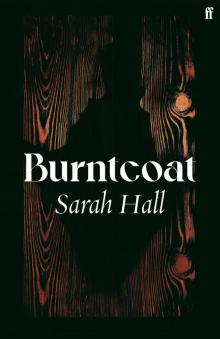 Burntcoat
Burntcoat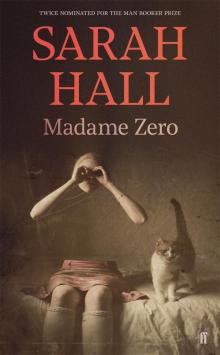 Madame Zero
Madame Zero Mrs Fox
Mrs Fox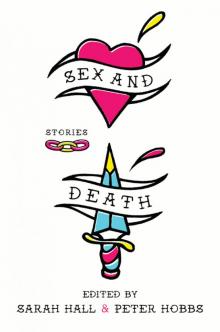 Sex and Death
Sex and Death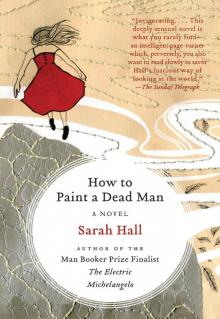 How to Paint a Dead Man
How to Paint a Dead Man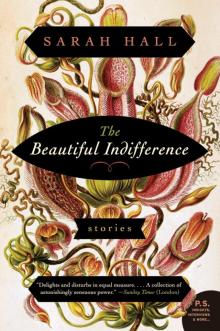 The Beautiful Indifference
The Beautiful Indifference The Wolf Border
The Wolf Border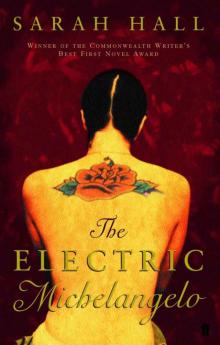 The Electric Michelangelo
The Electric Michelangelo